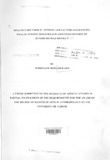| dc.contributor.author | Okwaro, Ferdinand M | |
| dc.date.accessioned | 2013-05-03T08:36:19Z | |
| dc.date.available | 2013-05-03T08:36:19Z | |
| dc.date.issued | 1999 | |
| dc.identifier.uri | http://erepository.uonbi.ac.ke:8080/xmlui/handle/123456789/18583 | |
| dc.description | Degree of Master of Arts in Anthropology | en |
| dc.description.abstract | This study examines the influence of socio-economic and cultural factors in the choice of
healthcare in a rural setting. The focus is on a rural community [area] since these areas
.have suffered inadequate modem medical facilities - a process initiated in the colonial
era, but which has continued unabated in the post-independence period. To be able to
investigate these factors, it was considered prudent to initially explore the range of
therapeutic options available to the rural residents ofKhwisero.
The rationale of this study is to examine why people follow the medical care
consumption patterns that can be observed [identified] within their socio-economic and
cultural setting. This information can then be used to make national policies on the
improvement of health care facilities more effective.
This study used both qualitative and quantitative methods of data collection and analysis.
Ethnographic methods such as in-depth interviews direct observation and focus group
discussion were used. Secondary data which was also used and comprised library
materials i.e books, journals and articles, that identified gaps of knowledge and helped
shape up this research.
A wide range of therapeutic options was found to be prevalent in the study area. This can
be broadly classified as falling either in the indigenous medical realm or in the modem
medical system. Factors such as aetiological beliefs, economic resources available to a
household, the severity of an illness and a patients' social matrix are investigated and
found to excercise a deterministic role in the choice of healthcare. Aetiological beliefs
for instance constrained the utilization of modem medical facilities for illnesses believed
to be supernaturally caused. The' adoption of in-kind, credit and property payment
procedures endeared rural cash-strapped households to private medical facilities and
traditional healers.
This study concludes that both traditional and modem. medical systems play a
complimentary and vital role in the fight against illnesses in rural areas. It is hereby
recommended that there is a need to impose checks in the provision of modem healthcare
services provided by community health workers and drug stores to guard against their
penetration by unscrupulous drug merchants. The role of traditional medicine in rural
areas is already obviated. There is however a need to institute a deliberate and practical
process to rediscover this lost heritage and to rid it of the obscurantist elements that have
crept in following the many years of official and subtle neglect | en |
| dc.language.iso | en | en |
| dc.title | Health care choice: options and factors influencing health seeking behaviour in khiwisero division of Butere/Mumias district | en |
| dc.type | Thesis | en |
| local.publisher | Institute of Anthropology, Gender & African Studies, University of Nairobi | en |

